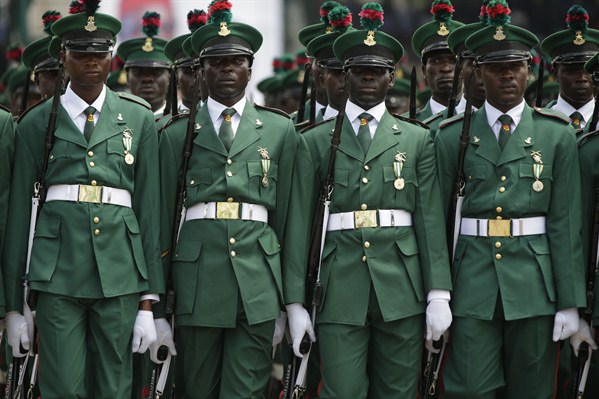Boko Haram no longer represents the same threat it did three years ago. But Nigeria’s heavy-handed military approach to fighting the group might still backfire. Find out more when you subscribe to World Politics Review (WPR).
Boko Haram, the Nigeria-based jihadi movement affiliated with the self-proclaimed Islamic State, has been in decline since 2015, since it began to lose territory around Lake Chad under joint military pressure from Nigeria, Niger, Chad and Cameroon. After retreating from major towns in northeastern Nigeria such as Bama and Mubi, Boko Haram now controls only certain remote rural areas in that corner of the country. But even though its strength peaked back in 2015, for Boko Haram, Nigeria and its neighbors are still a target, as the group’s decline has been uneven and frequently punctuated by shocking attacks.
Consider the military situation on the ground. One recent study found that in 2016, Boko Haram attacks fell by 29 percent compared with 2015, and the group inflicted 73 percent fewer casualties. Data for northern Cameroon show that after two deadly winters—2014-2015 and 2015-2016—Boko Haram has been less powerful. In December 2016, Nigerian forces raided Boko Haram camps in Nigeria’s Sambisa forest, one of the sect’s last remaining bastions.
Nevertheless, Boko Haram has repeatedly defied the Nigerian government’s claims that it is on the verge of defeat.
Even with a weakened Boko Haram, Nigeria still faces a long fight to eradicate the group. To learn more, read Boko Haram Is Weakening, but Its Decline Will Be Violent and Uneven for FREE with your subscription to World Politics Review.
As West African Nations Join To Fight Boko Haram, Real Coordination Remains Elusive
In 2016, a group of West African nations announced the creation of the Multinational Joint Task Force (MNTJF), a coalition whose main mission is to fight the militant group Boko Haram. Nigeria, Chad, and Niger orginally founded the task force in 1998 to address banditry around Lake Chad, but as Boko Haram gained power, pressure grew to restructure the MNTJF. The task force now has approximately 9,000 total troops, but nevertheless it is primarily a political prop rather than an integrated military outfit. The region’s national militaries largely pursue their own campaigns, while the optics of regional integration serve a political purpose: They explicitly support narratives about so-called African solutions to African problems, yet implicitly facilitate greater Western involvement in the fight against Boko Haram, often on a bilateral rather than truly multilateral basis.
To learn more about the difficulties of coordinating a regional approach to countering Boko Haram, read West Africa’s Regional Force Against Boko Haram Is a Political Prop for FREE with your subscription to World Politics Review.
[marketing]ofie[/marketing]
In The Fight With Boko Haram, Nigeria Is Using Self-Defeating Tactics
As a significant military partner of Nigeria, the United States is one of those Western countries involved in the fight against Boko Haram. Yet, the U.S. has routinely turned a blind eye to abuses by the Nigerian military battling the group in the northeast of the country. So far, there is every indication that this bilateral military engagement will continue under President Donald Trump. A frequent refrain in Washington policy circles is that it is imperative to depend on “strategic regional partners” to advance America’s security objectives. But while security partnerships, both multilateral and bilateral, are a valuable component of America’s national security toolkit, events in the Lake Chad basin suggest that Washington’s strategic partners are engaging in counterproductive behavior.
Military violence against civilians runs rampant in Nigeria’s battle against Boko Haram. To find out more, read In Partnering With Nigeria’s Abusive Military, the U.S. Is Giving Boko Haram a Lifeline for FREE with your subscription to World Politics Review.
Why the Fight Against Boko Haram Is Far From Over
Although the government of Nigerian President Muhammadu Buhari, in power since 2015, has long boasted that Boko Haram has been “technically defeated,” a string of losses since the start of the rainy season in July 2018 has underlined the hollowness of this claim. In fact, the insurgency has entered a new, deadlier phase, and there is concern that the military reversals will accelerate, deepening the humanitarian crisis triggered by the nine-year-long war. An estimated 600 Nigerian soldiers have been killed over the past six months alone. Buhari does not seem to be paying much attention to the progress of the war. Instead, he is far too focused on the February election, critics allege. For all its setbacks, though, the Nigerian military has had success against Boko Haram before, and there’s no reason to believe this success can’t be replicated if the right strategies are implemented.
Nigeria has faced setbacks since declaring victory over Boko Haram. To learn more, read ‘Year of the Debacle’: How Nigeria Lost Its Way in the War Against Boko Haram for FREE with your subscription to World Politics Review.
[marketing]ofie[/marketing]
Learn more about Boko Haram, Nigeria, and the international reaction to ongoing violence in the Lake Chad basin, in the searchable library of World Politics Review (WPR):
- Boko Haram has been rolled back, but Nigeria still hasn’t won yet, in Boko Haram Is Weakening, but Its Decline Will Be Violent and Uneven
- How a regional approach against Boko Haram is easier said than done, in West Africa’s Regional Force Against Boko Haram Is a Political Prop
- Why the Nigerian army’s heavy-handed approach toward civilians is undercutting its fight against Boko Haram, in In Partnering With Nigeria’s Abusive Military, the U.S. Is Giving Boko Haram a Lifeline
- Why the fight against Boko Haram is far from over, in ‘Year of the Debacle’: How Nigeria Lost Its Way in the War Against Boko Haram
[marketing]boilerplate[/marketing]
Editor’s Note: This article was first published in September 2018 and is regularly updated.

